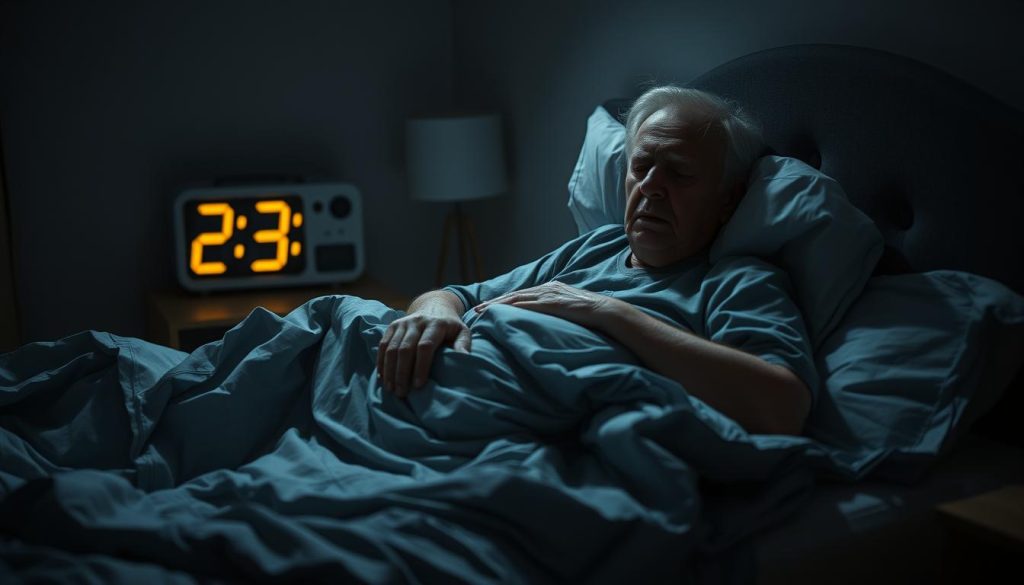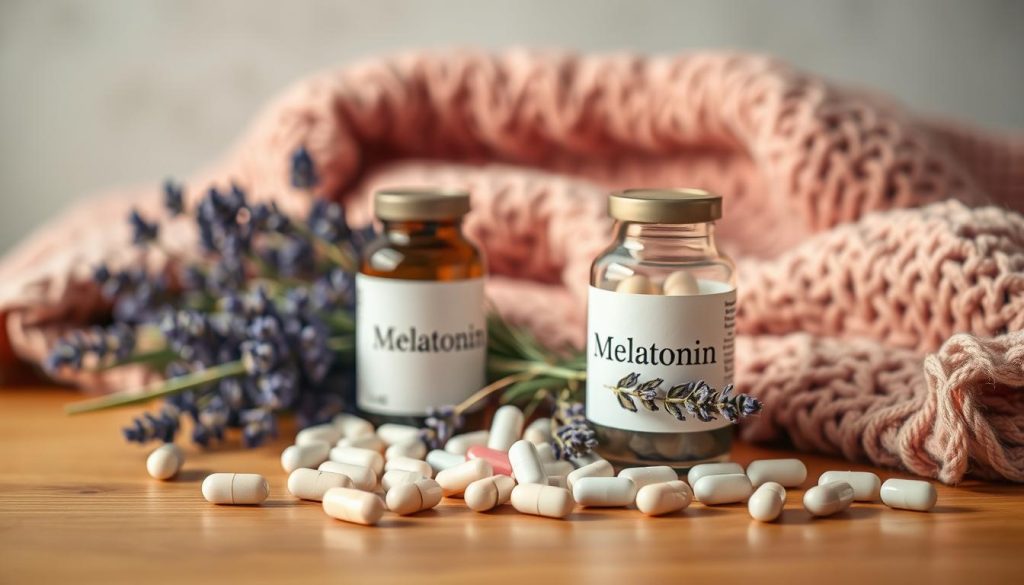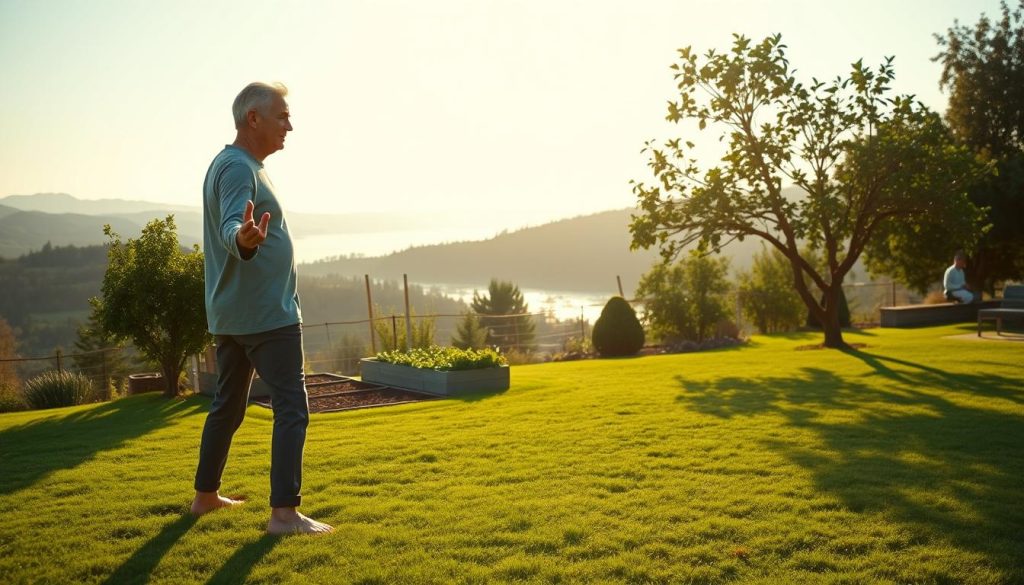As we get older, our body makes less melatonin. Melatonin is key for good sleep. This drop can make it hard to fall and stay asleep. It’s important to understand and manage this to stay healthy.
Many studies show how crucial it is to tackle melatonin loss in seniors. By using healthy aging tips every day, older people can sleep better. This improves their life quality.
This article will look into why melatonin drops with age and how to fight it. We’ll also talk about melatonin supplements. Let’s explore how to get a good night’s sleep and live a healthier life.
Understanding Age-Related Melatonin Decline
Melatonin is a key sleep hormone made by the pineal gland. It helps control our sleep and wake cycles. As we get older, our melatonin levels drop, causing sleep problems. It’s important to know how hormones change with age to keep our sleep healthy.
There are several reasons why older adults make less melatonin. One reason is the pineal gland ages and doesn’t work as well. This makes it hard to keep a regular sleep schedule.
Another reason is changes in sleep patterns with age. Older people often wake up more and have lighter sleep. These changes make sleep hormones drop even more, leading to a cycle of poor sleep and less melatonin.
Impact of Aging on Melatonin Production
Aging affects melatonin production a lot. This is because of changes in the pineal gland and how it works. As we get older, the pineal gland makes less melatonin. This is a key hormone for sleep.
Studies show that melatonin levels start to drop in middle age. They keep going down as we get older.
Melatonin is made from tryptophan, turning into serotonin and then melatonin. With age, this process gets slower. A study in the Journal of Clinical Endocrinology and Metabolism found that people over 60 have much less melatonin at night than younger people.
Many things can make melatonin levels go down with age. These include less natural light, changes in lifestyle, and how our body clocks work. Also, older adults have less estrogen and testosterone. This can make it harder to make sleep hormones.
It’s important to understand how aging affects melatonin. This helps us find ways to help older adults sleep better. By looking at how our bodies work and our lifestyle, we can improve sleep in older people.
| Age Group | Average Melatonin Level (pg/ml) | Key Observations |
|---|---|---|
| 20-30 | 60-80 | Peak production levels |
| 40-50 | 40-60 | Noticeable decline begins |
| 60+ | 20-40 | Significant reduction in production |
Signs of Melatonin Decline in Older Adults
A drop in melatonin levels can cause sleep problems that affect older adults’ quality of life. It’s important to know these signs to help them sleep better.
Difficulty Falling Asleep
One key sign of less melatonin is trouble falling asleep. Melatonin helps us sleep and wake up on time. Without enough, older adults might lie awake for hours. This can make them feel frustrated and affect their health.
Doctors often see this problem in seniors. It shows how important melatonin is for sleep.
Frequent Nighttime Awakenings
Another sign is waking up a lot at night. This can make sleep feel broken and not restful. It’s hard on the body and mind.
These wake-ups can make it hard to sleep well at night. It’s a big problem for older adults, making them feel tired all the time.
Daytime Sleepiness
Feeling tired during the day comes from not sleeping well at night. When older adults don’t get enough sleep, they can’t stay awake. This leads to more napping, which messes up their sleep even more.
This creates a cycle of sleep problems. It shows how important it is to fight insomnia and keep a regular sleep schedule.

Role of Circadian Rhythm in Aging
The circadian rhythm is key to our sleep-wake cycle and health. As we age, our biological clock changes. This can affect how we function daily. Research shows that these changes can lead to sleep issues, memory loss, and mood swings.
It’s important to know how aging affects our circadian rhythm. Studies say our biological clock shifts with age. This means older people might feel tired earlier and wake up sooner. These changes can impact our quality of life.
Moreover, a disrupted circadian rhythm can be serious for the elderly. For instance:
- Increased risk of cardiovascular diseases due to irregularities in blood pressure and heart rate.
- Heightened likelihood of metabolic disorders, such as diabetes and obesity.
- Greater incidence of mood conditions, such as depression and anxiety.
To tackle these issues, we need to reset our biological clock. Getting natural light, keeping regular sleep times, and adopting healthy habits are key. These steps help align our circadian rhythm with our body’s needs.
| Aging Impacts | Consequences |
|---|---|
| Disrupted Circadian Rhythm | Increased risk of health issues like cardiovascular diseases and metabolic disorders. |
| Sleep-Wake Cycle Changes | Altered sleep patterns leading to difficulty maintaining consistent sleep. |
| Advanced Biological Clock | Earlier sleep onset and wake times, impacting daily routines and alertness levels. |
To manage aging and circadian rhythm, stick to daily routines. Engage in physical activities and avoid caffeine before bed. Understanding and addressing our biological clock can greatly improve our health and well-being as we age.
Natural Ways to Boost Melatonin Levels
As we get older, our bodies make less melatonin, which can disrupt sleep. Luckily, there are natural ways to boost melatonin levels. By changing what we eat, getting more sunlight, and sticking to a sleep schedule, seniors can improve their sleep.
Dietary Changes
Eating foods high in melatonin can help. Cherries, walnuts, grapes, and tomatoes are good choices. They can boost melatonin levels. Also, eating foods rich in magnesium, like leafy greens and nuts, can help you relax and sleep better.
Exposure to Natural Light
Getting enough sunlight during the day is important. It helps keep your sleep-wake cycle in check. Spend at least 30 minutes outside each day, especially in the morning, to boost melatonin.
Establishing a Consistent Sleep Schedule
Being consistent with sleep is crucial. Going to bed and waking up at the same time every day helps your body’s internal clock. A relaxing bedtime routine and a dark, comfy sleep space can also help boost melatonin. Try to avoid screens and bright lights an hour before bed to help your body make more melatonin.
Benefits of Melatonin Supplements for Seniors
Melatonin supplements are gaining popularity among older adults. They help improve sleep and overall well-being. Since melatonin levels drop with age, these supplements can help address age-related issues.
Improved Sleep Quality
Melatonin supplements can greatly improve sleep for seniors. They help with falling asleep and staying asleep. This is crucial for daily functioning.
Studies show melatonin supplements can regulate sleep-wake cycles. This leads to better sleep quality.
Enhanced Cognitive Function
Melatonin supplements also support cognitive health. Research links melatonin use to better cognitive performance in older adults. This means improved memory, attention, and mental clarity.
These benefits are key for staying active and independent.
Possible Side Effects
It’s important to consider the safety of melatonin supplements. Common side effects include dizziness, daytime drowsiness, and headaches. Seniors should talk to their healthcare provider before starting melatonin.

| Benefits | Details |
|---|---|
| Improved Sleep Quality | Regulates sleep-wake cycle, reduces nighttime awakenings, and enhances sleep |
| Enhanced Cognitive Function | Supports memory, attention, and mental clarity |
| Possible Side Effects | Mild dizziness, daytime drowsiness, headaches |
Holistic Strategies to Mitigate Melatonin Decline with Age
As we get older, our melatonin levels drop, affecting our sleep. Using holistic sleep support can help. These methods include mind-body practices, changing our environment, and making lifestyle changes. They help keep melatonin levels balanced and improve our overall health.
Meditation and mindfulness are key, say experts in integrative health. They help calm the mind and set a natural sleep rhythm. Doing these daily can reduce stress and improve sleep and melatonin levels.
Creating a sleep-friendly environment is also crucial. Make sure your bedroom is dark, quiet, and cool. Avoid screens and blue light an hour before bed to help your body make more melatonin.
Anti-aging strategies like exercise and a healthy diet also help. Foods like tart cherries, bananas, and oats can naturally increase melatonin. They support a healthy sleep cycle.
So, using an integrative health approach and making environmental and lifestyle changes can fight melatonin decline with age. Older adults can get better sleep and health by adopting these practices.
Scientific Research on Melatonin and Aging
Recent studies have made big strides in understanding melatonin’s role in aging. They’ve looked into how this hormone impacts the aging process. Many studies have been done to see how melatonin levels relate to age-related problems.
Recent Studies
Recently, studies have been published in top journals like the Journal of Pineal Research and Aging Cell. These studies have focused on melatonin’s role in aging. They’ve looked at its antioxidant effects and how it affects sleep in older people.
Researchers found that lower melatonin levels are linked to more oxidative stress and sleep issues in older adults.
Future Directions
Future research on melatonin and aging aims to fill in the gaps in our knowledge. New studies suggest that more research is needed to understand melatonin’s long-term effects. This could help find new ways to treat age-related diseases.
Lifestyle Habits that Support Melatonin Production
Living a healthy lifestyle is key to keeping melatonin levels up. Adding sleep-promoting habits can greatly improve your sleep and overall health. Here are some effective strategies:
- Stress Reduction Techniques: Stress can lower melatonin levels. Try meditation, yoga, or deep breathing to reduce stress and sleep better.
- Avoiding Blue Light Before Bed: Blue light from screens can stop melatonin production. Cut down on screen time an hour before bed to boost melatonin.
- Mindful Medication Usage: Some meds can mess with melatonin levels. Talk to your doctor about how your meds affect melatonin and find alternatives if needed.
Adding these habits to your life can make a big difference. They help support a healthy aging lifestyle and keep melatonin levels right. Focus on these habits for better sleep and a refreshing rest.

Common Myths about Melatonin Decline and Aging
Melatonin levels drop as we age, leading to many myths about supplements. This section aims to clear up these misconceptions. It provides the truth about sleep aids for all ages.
Myth: Melatonin Supplements Are Harmful
Many believe melatonin supplements are harmful. But, the FDA says they are generally safe. It’s important to talk to a healthcare professional before starting any supplement. They can give advice tailored to your health.
Melatonin is a hormone that occurs naturally in our bodies. It’s not usually risky when taken in the right amounts. Side effects, if they happen, are often mild. They might include dizziness, headaches, or feeling a bit down. These can often be lessened by adjusting how much you take and when.
Myth: Only Seniors Need Melatonin Supplements
A common myth is that only older people need melatonin. While it’s true that older adults produce less melatonin, it’s not just for them. People of all ages can benefit from these supplements. They can help with sleep problems, jet lag, and work schedules, no matter your age.
In debunking melatonin myths, it’s clear that it can help improve sleep for people of all ages. Always follow the advice of healthcare professionals and FDA guidelines for safe use.
Personal Stories: Managing Melatonin Decline
Aging brings many challenges, especially with sleep. People share their experiences to help us understand how to deal with melatonin decline. Their stories show different ways to handle aging sleep issues, like changing lifestyles or using supplements.
Marie, a 68-year-old retiree, had trouble sleeping as she got older. She started going to bed and waking up at the same time every day. This helped her body get into a rhythm. She also made sure to get more sunlight during the day to sleep better at night.
Michael, a 72-year-old former engineer, tried melatonin supplements to stop waking up in the middle of the night. He noticed a big improvement in his sleep. His story shows how supplements can help with aging sleep problems.
These stories teach us that everyone is different. There’s no single way to tackle melatonin decline. People find their own solutions, whether it’s through natural remedies, diet changes, or supplements. Their experiences highlight the need for personalized approaches to aging sleep challenges.
Consulting Healthcare Professionals for Melatonin Issues
When you face melatonin decline with age, getting help from a professional is key. Sleep specialists and geriatricians can offer tailored advice. They help you find the right path for your health.
These experts know a lot about sleep and aging. Geriatricians focus on age-related issues. They suggest lifestyle changes and diet tweaks to improve sleep. They might also recommend safe melatonin supplements for your well-being.
The American Academy of Sleep Medicine stresses the need for expert advice. A consultation can reveal health issues affecting melatonin. Working with a healthcare professional means you’re not alone in tackling these challenges. It leads to better sleep and health as you get older.

